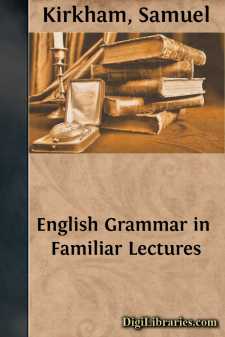Categories
- Antiques & Collectibles 13
- Architecture 36
- Art 48
- Bibles 22
- Biography & Autobiography 813
- Body, Mind & Spirit 141
- Business & Economics 28
- Children's Books 12
- Children's Fiction 9
- Computers 4
- Cooking 94
- Crafts & Hobbies 4
- Drama 346
- Education 46
- Family & Relationships 57
- Fiction 11826
- Games 19
- Gardening 17
- Health & Fitness 34
- History 1377
- House & Home 1
- Humor 147
- Juvenile Fiction 1873
- Juvenile Nonfiction 202
- Language Arts & Disciplines 88
- Law 16
- Literary Collections 686
- Literary Criticism 179
- Mathematics 13
- Medical 41
- Music 40
- Nature 179
- Non-Classifiable 1768
- Performing Arts 7
- Periodicals 1453
- Philosophy 64
- Photography 2
- Poetry 896
- Political Science 203
- Psychology 42
- Reference 154
- Religion 513
- Science 126
- Self-Help 83
- Social Science 81
- Sports & Recreation 34
- Study Aids 3
- Technology & Engineering 59
- Transportation 23
- Travel 463
- True Crime 29
English Grammar in Familiar Lectures
by: Samuel Kirkham
Categories:
Description:
Excerpt
LECTURE I
TO THE YOUNG LEARNER.
You are about to enter upon one of the most useful, and, when rightly pursued, one of the most interesting studies in the whole circle of science. If, however, you, like many a misguided youth, are under the impression that the study of grammar is dry and irksome, and a matter of little consequence, I trust I shall succeed in removing from your mind, all such false notions and ungrounded prejudices; for I will endeavor to convince you, before I close these lectures, that this is not only a pleasing study, but one of real and substantial utility; a study that directly tends to adorn and dignify human nature, and meliorate the condition of man. Grammar is a leading branch of that learning which alone is capable of unfolding and maturing the mental powers, and of elevating man to his proper rank in the scale of intellectual existence;—of that learning which lifts the soul from earth, and enables it to hold converse with a thousand worlds. In pursuing any and every other path of science, you will discover the truth of these remarks, and feel its force; for you will find, that, as grammar opens the door to every department of learning, a knowledge of it is indispensable: and should you not aspire at distinction in the republic of letters, this knowledge cannot fail of being serviceable to you, even if you are destined to pass through the humblest walks of life. I think it is clear, that, in one point of view, grammatical knowledge possesses a decisive advantage over every other branch of learning. Penmanship, arithmetic, geography, astronomy, botany, chemistry, and so on, are highly useful in their respective places; but not one of them is so universally applicable to practical purposes, as this. In every situation, under all circumstances, on all occasions;—when you speak, read, write, or think, a knowledge of grammar is of essential utility.
Doubtless you have heard some persons assert, that they could detect and correct any error in language by the ear, and speak and write accurately without a knowledge of grammar. Now your own observation will soon convince you, that this assertion is incorrect. A man of refined taste, may, by perusing good authors, and conversing with the learned, acquire that knowledge of language which will enable him to avoid those glaring errors that offend the ear; but there are other errors equally gross, which have not a harsh sound, and, consequently, which cannot be detected without a knowledge of the rules that are violated. Believe me, therefore, when I say, that without the knowledge and application of grammar rules, it is impossible for any one to think, speak, read, or write with accuracy. From a want of such knowledge, many often express their ideas in a manner so improper and obscure as to render it impossible for any one to understand them: their language frequently amounts, not only to bad sense, but non-sense. In other instances several different meanings may be affixed to the words they employ; and what is still worse, is, that not unfrequently their sentences are so constructed, as to convey a meaning quite the reverse of that which they intended....


